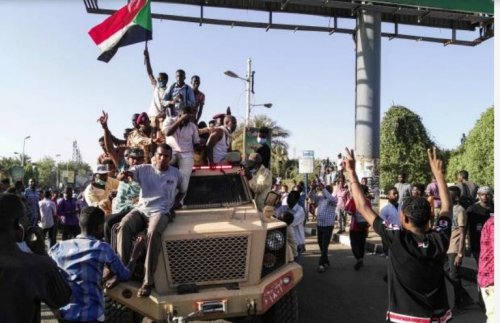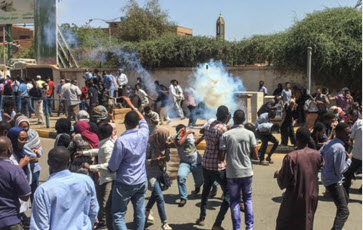www.aljazeerah.info
News, April 2019
Archives
Mission & Name
Conflict Terminology
Editorials
Gaza Holocaust
Gulf War
Isdood
Islam
News
News Photos
Opinion Editorials
US Foreign Policy (Dr. El-Najjar's Articles)
www.aljazeerah.info
|
Editorial Note: The following news reports are summaries from original sources. They may also include corrections of Arabic names and political terminology. Comments are in parentheses. |
8 Sudanese Protesters Killed, as Gathering at Army Headquarters Increases Pressure on Al-Bashir
April 7, 2019
 |
 |
| Sudanese protesters riding a military vehicle, in Khartoum, April 7, 2019 | Sudanese protesters attacked by police tear gas, April 7, 2019 |
Six Sudanese protesters killed as general strike continues
Sudan Tribune,April 7, 2019 (KHARTOUM) -
The Central Committee of Sudanese Doctors (CCSD) on Sunday said 6 protesters have been killed during the protests and the sit-in in front of the Sudanese army headquarters.
On Saturday, the opposition forces declared a general strike as well as an open-ended sit-in in front of the General Command of the Sudan Armed Forces (SAF) demanding the removal of the regime of President Omer al-Bashir.
The CCSD on Saturday said two protesters have been killed in West Darfur State and Khartoumís twin city of Omdurman.
In a statement on Sunday, the CCSD said three more protesters have been killed including Amro Gamal, Maab Hanafi and Ahmed Ibrahim Tabidi besides an unidentified protester, pointing that several protesters have sustained serious injuries.
Deadly protests have rocked Sudan since December 19, with demonstrators holding nationwide rallies calling on President Omer al-Bashir to resign.
The government said 31 people have died in the violence, while other credible reports including from Human Rights Watch says at least 51 people have been killed.
Also, dozens of demonstrators have been injured and hundreds arrested during the protests.
http://www.sudantribune.com/spip.php?article67335
Two killed in Sudanís anti-government protests
Sudan TribuneApril 6, 2019 (KHARTOUM) -
Two people were killed in Khartoum and West Darfur by live bullets on Saturday during the anti-government protests, said the Central Committee of Sudanese Doctors (CCSD).
Sudanese protesters run for cover from tear gas canisters fired by police outside the military headquarters in the capital Khartoum on April 6, 2019 (/AFP/Getty Images)
In a statement seen by Sudan Tribune, the CCSD said the killing of the peaceful protesters would only hasten the victory of the revolution.
Reliable sources told Sudan Tribune that a medical laboratory doctor named Al-Muiz Atta Allah Musa, died of his wounds after being shot by live bullet in Khartoumís twin city of Omdurman.
Also, multiple sources in West Darfur State said a woman was killed at the Khams Dagaiíg camp for Internally Displaced Persons (IDPs).
Following the killing of the IDP, large protests erupted in west Darfur capital of Zalingei prompting security forces and the police to use teargas to disperse it.
On Saturday, thousands of Sudanese staged protests in Khartoum and several states demanding the downfall of the regime of President Omer al-Bashir.
Deadly protests have rocked Sudan since December 19, with demonstrators holding almost daily nationwide rallies calling on Bashir to resign.
The government said 31 people have died in the violence, while Human Rights Watch (HRW) put the figures at 51 .
Also, dozens of demonstrators were injured and hundreds others arrested during the protests which are now banned , unless a permit is given, under Bashir emeregncy declaration issued last month.
http://www.sudantribune.com/spip.php?article67332
Thousands of Sudanese rally in front of military headquarters
Sudan Tribune
April 6, 2019 (KHARTOUM) -
Thousands of Sudanese staged protests in front of the General Command of the Sudan Armed Forces (SAF) demanding the removal of the regime of President Omer al-Bashir.
Sudanese protesters chant slogans outside the army headquarters in Khartoum. Photograph: AFP/Getty Images
Last week, the opposition forces of the Declaration of Freedom and Change (DFC) called on the Sudanese to join the April 6 rally heading to the SAF command to demand that the army side with the protesters.
Since the early hours of Saturday, Sudanese authorities sealed off the bridges leading to the capital to prevent protesters from joining the rally. However, thousands managed to break the siege and poured into the streets of downtown Khartoum and managed to arrive at the SAF command.
Security forces and police fired teargas to disperse protesters who gathered in front of the SAF command but army officers reportedly intervened to stop the police action.
Also, thousands of protesters have taken to the streets at a number of states including Kassala, Port Sudan, Gezira, River Nile, West and South Darfur.
Following the rally, DFC issued a statement declaring an open-ended sit-in in front of the SAF command and called on all Sudanese to join .
This is the longest streak of protests in the history of Sudan which now entered its 4th month.
Last February, President Omer al-Bashir declared a state of emergency in a bid to end it but the demonstrations have continued unabated.
http://www.sudantribune.com/spip.php?article67331
***
Sudan: Protesters at army HQ keep pressure on Bashir
By Fergal Keane, BBC Africa Editor
April 7, 2019
Thousands of demonstrators are spending a second night camped outside Sudan's army headquarters, demanding that President Omar al-Bashir step down.
They appear to be hoping for an internal coup, pleading with the army command to remove Mr Bashir and open the way for a transitional government.
It is the biggest protest against Mr Bashir since unrest began in December.
Mr Bashir has refused to leave, saying opponents should seek power through elections. The army has not intervened.
Security forces have fired tear gas to try to disperse protesters outside the army compound in the capital, Khartoum.
The latest rallies mark the 34th anniversary of the coup that overthrew the regime of former President Jaafar Nimeiri.
In previous protests they have also used stun grenades and live bullets. Dozens of demonstrators have been killed.
On Saturday, a protester died in Khartoum's twin city of Omdurman, police said.
Sudan's information minister has reaffirmed the government's plan to resolve the crisis through talks and praised the security forces.
Unpredictable political struggle
Certainly the scenes in Khartoum are impressive. Nothing like these crowds has been witnessed in decades.
But there have been several deaths and there is the possibility of a brutal crackdown operation at any moment.
And even if Mr Bashir were to step down there is no certainty that he would be replaced by the pluralistic government demanded by the demonstrators.
Authoritarian states in 21st Century Africa have become adept at creating the impression of change but delivering little of its substance.
What is unfolding now may be part of a much longer and more unpredictable political struggle.
Why are people protesting?
Journalist Mohamed Ali Fazari, who was at the scene in Khartoum, said protesters were urging the army to side with the people against the government.
The crowd chanted "freedom, freedom, justice - one people one army", he told BBC Focus on Africa radio.
The protests were originally sparked by a hike in the cost of living but are now calling for the president, who has been in power for nearly 30 years, to step down.
Sudan's economy has long been strained since the US imposed sanctions more than 20 years ago, accusing Khartoum of sponsoring terror groups.
Image copyrightAFPImage caption Authorities have used tear gas to try to disperse the protesters
In December last year, the Sudanese government announced the price of fuel and bread would rise.
In the year leading up to this, inflation had risen while the Sudanese pound fell rapidly in value.
The announcement of the price rises triggered protests, which evolved into calls for President Bashir to step down.
His rule has been blighted with accusations of human rights abuses. In 2009 and 2010, the International Criminal Court (ICC) charged him with counts of genocide, war crimes and crimes against humanity. A warrant for his arrest has been issued.
Who are the demonstrators?
The Sudanese Professionals Association (SPA) - a collaboration of health workers and lawyers - has been organising the protests.
Doctors have emerged as a leading force and as a result are being targeted by the authorities.
It is estimated that up two thirds of the protesters are women, who say they are demonstrating against Sudan's sexist and patriarchal society.
Media playback is unsupported on your device
Sudan protests: 'No amount of beating will make us stop'
Media captionSudan protests: 'No amount of beating will make us stop'
How has the president responded?
In February, it looked like he might give in to protests and step down, but instead Mr Bashir declared a state of national emergency.
Image copyrightReuters Image caption President Bashir spoke to the National Dialogue Committee at his palace on 5 April
On the streets, security has been heavy, with tear gas used indiscriminately and reports of violence commonplace.
Media playback is unsupported on your device
Sudan protests: People flee gunshots in deadly protest
Media captionSudan protests: People flee gunshots in deadly protest
Sudanese authorities have been accused of arresting prominent activists and targeting medics, which the National Intelligence Security Service has denied.
Authorities say 32 people have died in protest-related violence so far, but Human Rights Watch says the figure is more like 51.
The pressure group Physicians for Human Rights says it has evidence of killing, persecution and torture of peaceful protesters and the medics caring for them.
https://www.bbc.com/news/world-africa-47846334
***
Share the link of this article with your facebook friendsFair Use Notice
This site contains copyrighted material the
use of which has not always been specifically authorized by the copyright
owner. We are making such material available in our efforts to advance
understanding of environmental, political, human rights, economic,
democracy, scientific, and social justice issues, etc. We believe this
constitutes a 'fair use' of any such copyrighted material as provided for
in section 107 of the US Copyright Law. In accordance with Title 17 U.S.C.
Section 107, the material on this site is
distributed without profit to those
who have expressed a prior interest in receiving the included information
for research and educational purposes. For more information go to: http://www.law.cornell.edu/uscode/17/107.shtml.
If you wish to use copyrighted material from this site for purposes of
your own that go beyond 'fair use', you must obtain permission from the
copyright owner.
|
|
|
|
||
|
||||||


